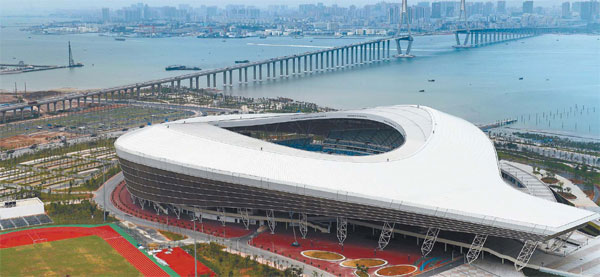
Zhanjiang speeds up development The coastal city of Zhanjiang is on track for rapid and healthy growth with a number of infrastructure and industrial projects completed or under construction. (Photos provided to China Daily)
Coastal city aims to balance economic growth and environmental protection.
Zhanjiang, a coastal city in the southwest of Guangdong province, is speeding up efforts to shift from an agriculture-based economy into one driven by clusters of major industries, such as shipbuilding, petrochemicals and steelmaking.
Liu Xiaohua, Party chief of the city, said that Zhanjiang, known as the city of shrimps, has already rolled out measures and preferential policies to attract large State-owned enterprises to develop operations in the city.
"The development of a city mostly relies on the level of industrialization," Liu said. "If you don't have core industries, where is the local tax coming from and if there is no tax, how can you build a welfare society?"
Zhanjiang is a big agricultural city, which produces seafood, tropical fruits and vegetables but the development of agriculture alone no longer meets the demand for local economic growth, the Party chief said.
He said the government puts people at the heart of social and economic development plans, which is why they should put more focus on manufacturing industries to generate more wealth for the local people.
"The main driver for the city's economy will be mass entrepreneurship and innovation oriented to update manufacturing industries," Liu said.
However, the transformation is no easy task especially as many cities in China have slipped into production overcapacity amid slowing economic growth.
To achieve its goal, Zhanjiang, as a strategic city along the 21st Century Maritime Silk Road, will explore more opportunities through the Belt and Road Initiative, integrating itself into the big picture, the Party chief said.
The Belt and Road Initiative refers to the Silk Road Economic Belt and 21st Century Maritime Silk Road, aimed at promoting economic and cultural ties with neighboring countries.
Strategic location
Situated on the Leizhou Peninsula in southwest Guangdong province, Zhanjiang has an important strategic location, as it provides a main channel to connect China with Southeast Asia.
"The city has huge potential for developing its maritime industries, so we should take full advantage of the maritime resources to develop port and shipbuilding industries in the first place," Liu said.
Centering on the bay area of Zhanjiang, the city will use new advancements in science and technology to develop maritime industries and help China in its goal to become a stronger maritime power, he said.
Measures such as lower tax and construction of supporting facilities and industries are provided to domestic and multinational companies to promote industrial clusters as a new engine for economic growth, Liu said.
"We plan to develop some leading industries including steelmaking, petrochemicals and papermaking, using our advantage of being a coastal city, and then build more industrial clusters in the region," he said.
Last year, with investment of 12.4 billion yuan ($2 billion), construction on about 40 projects was completed. When operational, the projects are expected to generate annual revenue of 19 billion yuan. Liu said that construction on another 50 industrial projects has started with planned investment of 8.3 billion yuan.
Liu noted that in the past, the lack of transportation infrastructure and logistics hindered the efforts of the local government in regards to development.
"The poor condition of the transport network has hindered local economic growth," Liu said.
"If you look at those more developed cities and regions such as the Pearl River Delta and Yangtze River Delta, they have very good transport systems, so we should seize the opportunities under the Belt and Road Initiative to break the bottleneck," he said.


















































